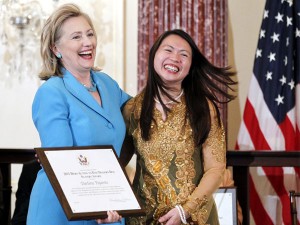
Secretary of State Hillary Rodham Clinton presents a 2011 Hero Acting to End Modern Day Slavery Award to Darlene Pajarito, a prosecutor from Zamboanga City, Philipines, coinciding with the release of the 2011 Trafficking in Persons Report, Monday at the State Department in Washington. AP
WASHINGTON – The United States on Monday removed the Philippines and Singapore from a human trafficking watch list that had drawn concerns from the close allies, but it reported record abuses around the world.
The State Department’s annual Trafficking in Persons Report has become increasingly sensitive for Southeast Asian governments, which face a cut off of US assistance if they are found to be unresponsive in fighting trafficking.
The latest report elevated the Philippines, Singapore and Laos off the watch list to so-called Tier 2, which means that the countries do not fully meet standards on human trafficking but are making efforts to do so.
Indonesia and Cambodia stayed at Tier 2, but Brunei, Malaysia, Thailand and Vietnam remained on the watch list. The only Asian jurisdictions on Tier 1, meaning full compliance, were South Korea and Taiwan.
Releasing the report, Secretary of State Hillary Clinton said that as many 27 million men, women and children suffered from trafficking around the world for sexual exploitation or forced labor.
“Unfortunately, because of the ease of transportation and the global communications that can reach deep into villages with promises and pictures of what a better life might be, we now see that more human beings are exploited than before,” Clinton said.
But US allies have sometimes responded indignantly. Singapore last year lashed out at being put on the watch list and urged the United States to examine its own record, including the treatment of its millions of illegal residents.
The United States gave itself a Tier 1 ranking but offered details about problems at home, including allegations of exploitation by federal contractors.
“I don’t think it’s fair for us to rank others if we don’t look hard at who we are and what we’re doing,” Clinton said.
In the Philippines, President Benigno Aquino took the unusual step of saying in April that his country was off the watch list, leading US officials to clarify that no decision had yet been made.
In Monday’s report, the State Department praised an “intensified effort” by the Philippines. It said the Philippines convicted 25 trafficking offenders, compared with nine the previous year, including first-ever convictions for forced labor.
Elsewhere in Asia, the State Department removed Sri Lanka and Fiji from its watch list. It praised Sri Lanka — often on the receiving end of criticism over human rights — for its first convictions under an anti-trafficking law on the island, which is a major source of workers to abuse-prone Arab countries.
On the other hand, the United States downgraded the Federated States of Micronesia to Tier 3, meaning that some assistance will be suspended to the nation of more than 600 islands that is closely linked to the United States.
The report said that Micronesian traffickers have forced women into prostitution in the United States with promises of well-paying jobs.
The State Department said that Micronesian waters are believed to be rife with trafficking but that the government has not conducted any investigations into the problem.
Myanmar, North Korea and Papua New Guinea remained at Tier 3. In a change this year ordered by the US Congress, countries that stay on the watch list for two consecutive years now automatically drop to Tier 3 — although the administration can order an exemption.
Representative Chris Smith, who authored the 2000 act that set up the report, criticized President Barack Obama’s administration for letting China remain on the watch list again instead of dropping automatically to Tier 3.
“Two years of warning is enough. The Obama administration has again abandoned trafficking victims in China — who are predominantly women. It’s shameful,” said Smith, a Republican from New Jersey.
“Our obligation is to the victims of trafficking, not the dictatorship,” he said.

